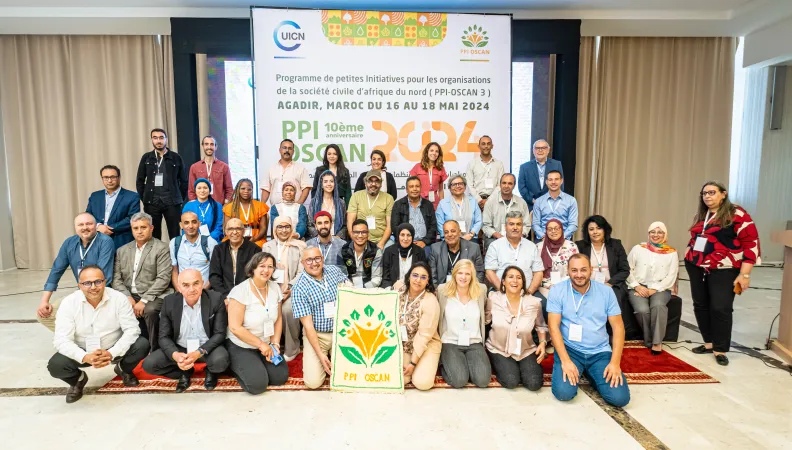Share the page
PPI-OSCAN - the North African Civil Society Organisations - Programme des Petites Initiatives- is 10 years old
Published on

On 16-18 May, a decade of commitment to biodiversity conservation in North Africa was celebrated in Agadir, Morocco. To mark this event, the International Union for Conservation of Nature has, through its Centre for Mediterranean Cooperation (IUCN Med) and other partners, organised the Regional Workshop for the Programme des Petites Initiatives (PPI) for North African Civil Society Organisations (OSCAN). This workshop brought 27 beneficiary organisations together with institutional and finance partners.
The French Facility for Global Environment (FFEM) has been a long-time leading partner of PPI-OSCAN since its creation in 2014. This programme supports newer organisations in the implementation of real-world projects that benefit local populations and contribute to biodiversity preservation and combating climate change. To date, 108 projects have been financed as part of PPI-OSCAN across four North African countries: Algeria, Libya, Morocco and Tunisia.
The primary goal of the Regional Workshop is to kick-off work to capitalise past learnings and consider potential improvements with the main institutional and financing partners, with a view to mapping out the initiative’s future. The event was also an opportunity to announce the extension of the programme to Egypt, with financing from the three new associations. In his opening speech Nicolas Rossin, Head of Biodiversity Projects at the FFEM, stated:
The workshop provided a unique platform for beneficiary organisations to share their experience and knowledge of nature conservation. The event was structured around group workshops, with specific sessions dedicated to capitalisation of the three phases of PPI-OSCAN, highlighting the learnings drawn and future prospects. In-depth discussion also took place on Nature-based Solutions (NbS), for example, a workshop led by Marion Poncet of the French UICN Committee, as well as feedback from Chanceline Tchibozo, a specialist in the economics of nature from the Beninese NGO ACED, showcasing the synergies between PPI-OSCAN projects and those of the West African PPI. Hélène Willem, Head of Communications at PPI-OSCAN, underscored the importance of these meetings:
Souhaiel Laarif, Coordinator of the BiorecBouhedma project, added:
Another highlight of the workshop was a visit to the Souss Massa National Park, organised by the Moroccan National Agency for Water and Forests (ANEF). Participants were given the opportunity to see first-hand the conservation efforts underway in Morocco, the Sous Massa NP being both a Ramsar-accredited and globally-important wetland for the nesting and over-wintering of migratory birds, and an iconic site for the reintroduction to Morocco of a number of species lost over the last decades, such as the Addax antelope, red-necked ostrich and Dorcas gazelle. The visit strengthened ties between the actors involved and led to better understanding of the conservation challenges and opportunities on the ground.
PPI-OSCAN is part of a wider initiative, the Small Initiatives Programme (PPI). Created in 2006 by the French Facility for Global Environment (FFEM), and managed since 2007 by the French Committee at the IUCN for sub-Saharan Africa, then as from 2014 for Northern Africa with IUCN Med, these programmes today comprise the only tool for French cooperation to directly fund Global South CSOs for specific biodiversity conservation actions. Through Nature-based Solutions, the PPI supports local organisations to develop and manage projects and enhance their ability to influence environmental policies at regional and national levels.
Drawing on PPI-OSCAN’s 10 years of capitalisation work and the recommendations from the 3rd phase of the project, (due to conclude in 2025), FFEM will be working with IUCN Med from early 2025 to prepare the 4th phase of the PPI-OSCAN programme by consolidating and enhancing it to assist these vital conservation actors, both on the ground and among wider populations.
